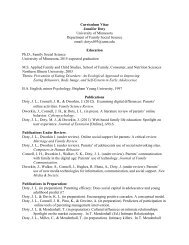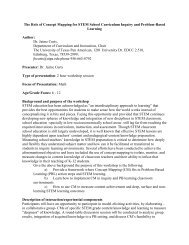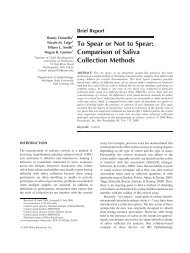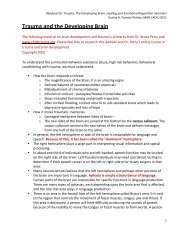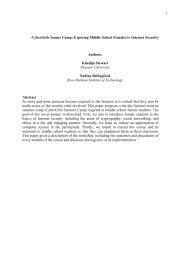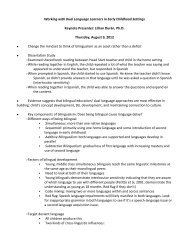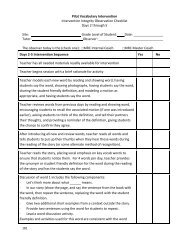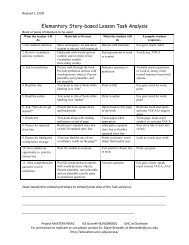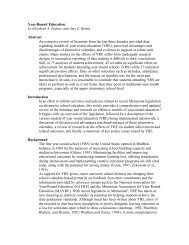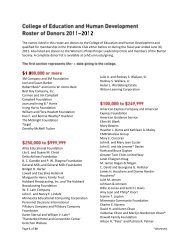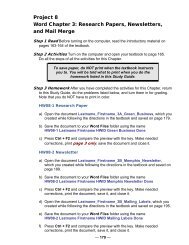Introduction to Positive Ways of Intervening with Challenging Behavior
Introduction to Positive Ways of Intervening with Challenging Behavior
Introduction to Positive Ways of Intervening with Challenging Behavior
Create successful ePaper yourself
Turn your PDF publications into a flip-book with our unique Google optimized e-Paper software.
not attacking him and she is avoiding embarrassing him by taking him aside. Students are far more likely <strong>to</strong><br />
respond positively <strong>to</strong> this type <strong>of</strong> communication.<br />
Feedback also helps cultivate positive rapport. Specific, nonjudgmental comments about student behavior,<br />
both appropriate and inappropriate, communicate <strong>to</strong> students that they are responsible for and in control <strong>of</strong> their<br />
behavior. Avoid comparing students. Feedback must be contingent upon behavior, which means it is dependent<br />
upon and immediately following it. It should also specifically describe the behavior being evaluated. The<br />
preceding example <strong>of</strong> the "I" statement applies here.<br />
This is also important in giving praise. Students are <strong>of</strong>ten <strong>to</strong>ld that they are good at something rather than that<br />
their hard work and determination have resulted in success. It is important that students attribute success and<br />
failure <strong>to</strong> fac<strong>to</strong>rs under their control. For example, "Sheila, this is excellent work. It shows that you worked very<br />
hard on this assignment and put a lot <strong>of</strong> thought in<strong>to</strong> it. You should be very pleased <strong>with</strong> the result. I am very<br />
pleased."<br />
Judging when <strong>to</strong> use questions versus statements is also important. There are many situations when it is<br />
tempting <strong>to</strong> use statements when a question may be more appropriate. For example, Durand has come in late for<br />
the third time in two weeks, interrupting your lecture. Up <strong>to</strong> this point, you have not made an issue <strong>of</strong> it, but now<br />
you are very frustrated at having been disrupted. It would be very easy <strong>to</strong> say, "If you come <strong>to</strong> class late again,<br />
you'll be spending your lunch period <strong>with</strong> me doing extra work." This is likely <strong>to</strong> humiliate Durand and make him<br />
angry. It would be much more productive <strong>to</strong> ask Durand, "This is the third time you have been late. What's going<br />
on?" You might find out that he has been running errands for another teacher who was unaware that this was<br />
causing him <strong>to</strong> be late or that he has <strong>to</strong> help get his little brothers and sisters ready for school and this is causing<br />
him <strong>to</strong> be late. Even if there is not a good reason, you have communicated <strong>to</strong> him that he has the opportunity <strong>to</strong><br />
explain himself and that you can work <strong>to</strong>gether <strong>to</strong> come up <strong>with</strong> a solution.<br />
At other times, statements might be more appropriate. There are some questions which students have a<br />
difficult time answering, especially in front <strong>of</strong> their peers. If you and Karen both know that she is typically five<br />
minutes late <strong>to</strong> class because she stands in the hall and talks <strong>to</strong> her friends, asking her why she is always late will<br />
probably only lead <strong>to</strong> anger and defensiveness. In such a case, taking Karen aside and making a statement such as,<br />
"Karen, it disrupts my class when you come in late. I need you <strong>to</strong> come in<strong>to</strong> the room when the first bell rings"<br />
may be more appropriate. If you notice that a student appears extremely angry or embarrassed about something,<br />
asking how he or she feels will also probably be unproductive. It is probably better <strong>to</strong> suggest that he or she go<br />
work at the computer or give an errand <strong>to</strong> run <strong>to</strong> relieve him or her <strong>of</strong> an uncomfortable situation.<br />
Finally, making positive statements is very important. The bulk <strong>of</strong> research shows that teachers make far<br />
more negative than positive statements. Research also shows that an increase in positive statements can lead <strong>to</strong> a<br />
decrease in negative behavior. Again, it is important that these comments are contingent upon positive behavior<br />
and are specific and credible.<br />
How do I become a skilled receiver?<br />
Being a skilled receiver means being an active listener. First and foremost, you need <strong>to</strong> practice being an<br />
empathic, nonjudgmental listener. This is very important in keeping lines <strong>of</strong> communication open. Even if you do<br />
not agree <strong>with</strong> or approve <strong>of</strong> what a student is telling you, the important thing is that they are communicating <strong>with</strong><br />
you. You do not want <strong>to</strong> discourage this communication.<br />
By giving the student your full attention, nodding, saying "M-hm," "Yes," paraphrasing, and asking questions,<br />
you let a student know that it is okay <strong>to</strong> talk about feelings which may be uncomfortable. Also, you give the<br />
student an opportunity <strong>to</strong> reexamine and clarify their options for dealing <strong>with</strong> the situation.<br />
My role as a model: How can it affect my rapport <strong>with</strong> students?<br />
First, by improving your communication skills in the ways listed above, you serve as a very important model for<br />
students who are developing their own methods <strong>of</strong> communication.<br />
By modeling the behavior you want students <strong>to</strong> imitate at the very beginning <strong>of</strong> the year, you portray yourself<br />
as caring, competent, and possessed <strong>of</strong> clear expectations for your students. This can make the first few days <strong>of</strong>



